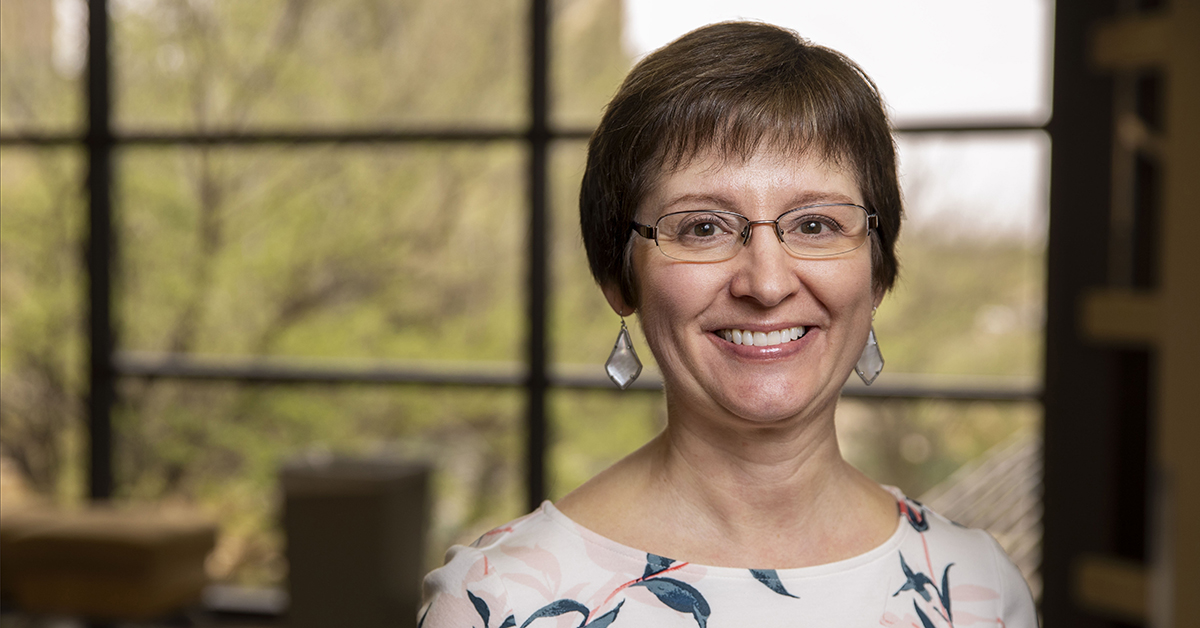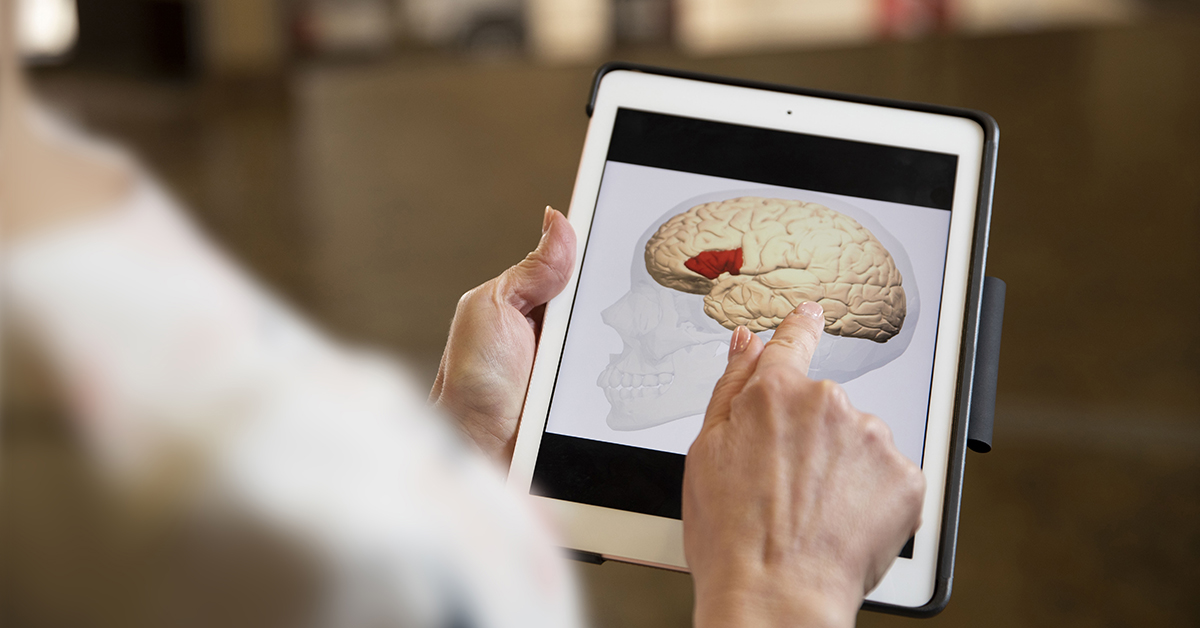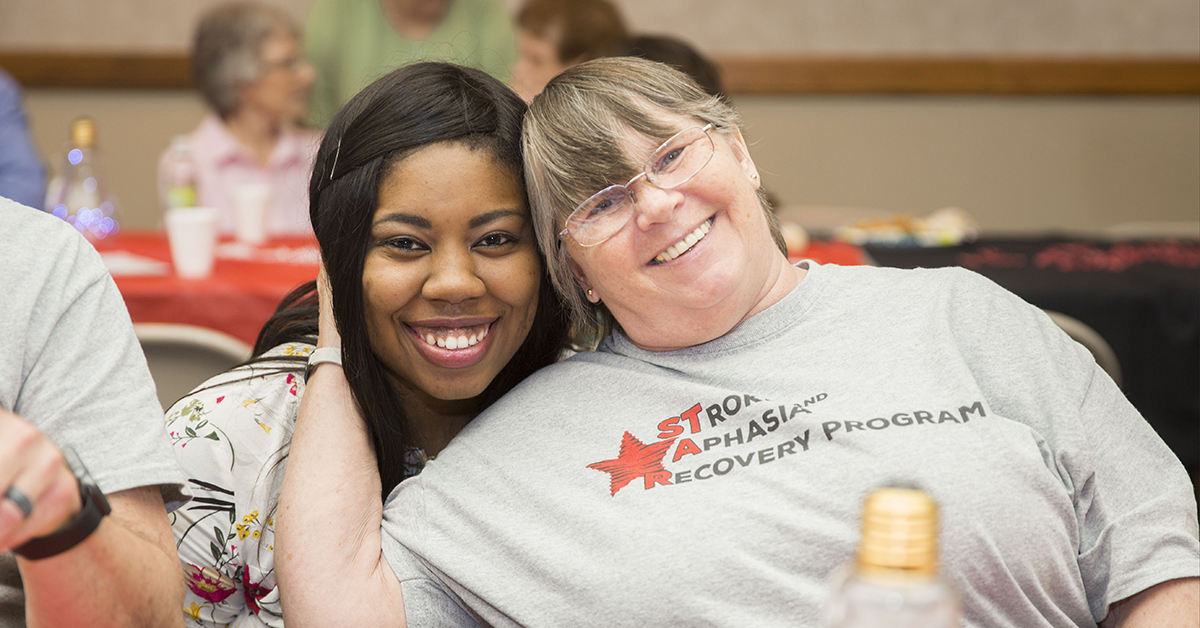Communicating for Aphasia
App improves communication between providers and aphasia patients

Melinda Corwin, Ph.D., CCC-SLP, has served individuals with aphasia for 30 years.
When the brain doesn’t receive enough blood and oxygen, many individuals experience
a stroke. Aphasia occurs when the brain is injured from a stroke, head trauma, brain
tumors or infections and happens mostly in older people.
Aphasia disrupts communication and impairs language processing. This affects every
aspect of an individual’s ability to produce or comprehend speech and the ability
to read or write. More than two million people in the U.S. are living with aphasia.
Melinda Corwin, Ph.D., CCC-SLP, has served individuals with aphasia for 30 years.
As the director of the Stroke & Aphasia Recovery (StAR) Program and a professor in
the Department of Speech, Language, and Hearing Sciences, Corwin knows first-hand
the need to help individuals with aphasia.
“Because communication is at the core of everyone’s daily life, aphasia has significant
and far-reaching consequences,” said Corwin. “People with aphasia often experience
social isolation, reduced life participation and loss of friendships, which negatively
impacts their quality of life.”
“My students and I strive to provide communication access for persons with aphasia
and their family members, friends, health care providers, and coworkers. Aphasia should
not have to result in loneliness, depression, and isolation. We use the life participation
approach to aphasia to promote communication and well-being.”

The ultimate goal of the app is to improve communication between providers and aphasia patients.
With the many patients in West Texas experiencing aphasia, Corwin saw a need to improve
health care providers’ communication with aphasia patients.
Corwin and colleagues from the Texas Tech University School of Art, Indiana University
Media School and Texas Tech University College of Media and Communications, created
a prototype for a story-based, interactive app that will explain stroke and aphasia
in a patient-friendly manner.
Miscommunication can result in serious adverse events such as medication errors, poor
patient satisfaction and hospital readmissions. This app will enable individuals with
aphasia to communicate with providers and improve patient outcomes.
“I envision a future in which strong patient-provider communication will be the crux
of excellent medical care,” said Corwin.

The Stroke & Aphasia Recover (STAR) Program serves approximately 40 stroke and brain injury survivors & 25 caregivers every week during the fall & spring semesters.
The new app is a piece of the puzzle to improved patient care and awareness for patients
with aphasia. For the past 21 years, the StAR Program has been engaging speech-language
pathologists, students and stroke survivors to help patients regain life participation
in the Lubbock community.
Speech language pathologists are trained to help children and adults access spoken
and written communication in health care, education, vocation and community settings.
Reflecting on her years at the StAR Program, Corwin said, “A patient once told me
that doctors saved her life, but the speech-language pathologists helped her find
a life worth living again.”
Related Stories
Celebrating Veterans: TTUHSC’s General Martin Clay’s Legacy of Service and Leadership
From his initial enlistment in the Army National Guard 36 years ago to his leadership in military and civilian health care management roles, Major General Martin Clay’s career has been shaped by adaptability, mission focus and service to others.
Texas Tech University Health Sciences Center School of Nursing Named Best Accelerated Bachelor of Science in Nursing Program in Texas
The TTUHSC School of Nursing Accelerated Bachelor of Science in Nursing (BSN) program has been ranked the No. 1 accelerated nursing program in Texas by RegisteredNursing.org.
TTUHSC Names New Regional Dean for the School of Nursing
Louise Rice, DNP, RN, has been named regional dean of the TTUHSC School of Nursing on the Amarillo campus.
Recent Stories
The John Wayne Cancer Foundation Surgical Oncology Fellowship Program at Texas Tech University Health Sciences Center Announced
TTUHSC is collaborating with the John Wayne Cancer Foundation and has established the Big Cure Endowment, which supports the university’s efforts to reduce cancer incidence and increase survivability of people in rural and underserved areas.
TTUHSC Receives $1 Million Gift from Amarillo National Bank to Expand and Enhance Pediatric Care in the Panhandle
TTUHSC School of Medicine leaders accepted a $1 million philanthropic gift from Amarillo National Bank on Tuesday (Feb. 10), marking a transformational investment in pediatric care for the Texas Panhandle.
Texas Tech University Health Sciences Center Permian Basin Announces Pediatric Residency Program Gift
TTUHSC Permian Basin, along with the Permian Strategic Partnership and the Scharbauer Foundation, Feb. 5 announced a gift that will fund a new pediatric residency.
